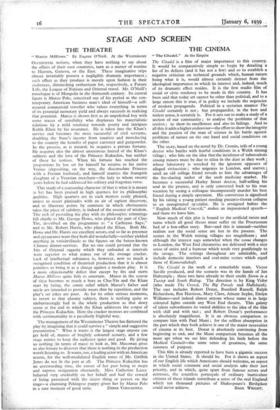STAGE AND SCREEN
THE THEATRE
" Marco Millions." By Eugene O'Neill. At the Westminster
OCCIDENTAL writers, when they have nothing to say about the affairs of their own countries, turn as a matter of routine to Heaven, Geneva, or the East. These imaginative trips almost invariably possess a negligible dramatic importance ; such effect as they produce is merely upon fashion in their audiences, diminishing enthusiasm for, respectively, a Future Life, the League of Nations and Oriental travel. Mr. O'Neill's travelogue is of Mongolia in the thirteenth century. Its central figure is Marco Polo, conceived out of his period as the con- temporary American business man's ideal of himself—a self- assured commercial traveller who values everything in terms of its potential monetary yield and always succeeds in realising that potential. Marco is shown first as an unpolished boy with some traces of sensibility who displeases his materialistic relations by a mild tendency towards poetry and intrigues Kubla Khan by his assurance. He is taken into the Khan's service and becomes the most successful of civil servants, doubling the State's income from taxation and introducing to the country the benefits of paper currency and gunpowder. In the process, as is natural, he acquires a private fortune. He acquires also the almost unanimous hatred of the Khan's subjects and the love of the Princess Kukachin, but neither of these he notices. When his fortune has reached ' the proportions he has set for himself he returns to his native Venice (depositing, on the way, the disconsolate Princess with a Persian husband), and himself marries the frumpish daughter of a Venetian merchant—the lady to whom twenty years before he had addressed his solitary and forgotten verse.
This study of a coarsening character (if that is what it is meant to be) has been praised in high quarters for its philosophic qualities. High quarters are in such matters easily pleased, unless to assert platitudes with an air of sapient discovery, and to illustrate points by contrasts in which obviousness takes the place of subtlety, is indeed of the essence of wisdom. The task of providing the play with its philosophic trimmings fell chiefly to Mr. George Howe, who played the part of Chu- Yin, described on the programme as " a Cathayan Sage," and to Mr. Robert Harris, who played the Khan. Both Mr. Howe and Mr. Harris are excellent actors, and so far as presence and appearance went they both did wonderfully—neither yielded anything in verisimilitude to the figures on the better-known Chinese dinner-services. But no one could pretend that the bits of Oriental sagacity which they unloaded at intervals were superior to what comes out of the average cracker. Lack of intellectual substance is, however, now so much a recognised condition of theatrical production that it is almost pointless to bring it as a charge against a modern play. It is a more objectionable defect that except by fits and starts Marco Millions quite fails to entertain. Marco in the course of tirae becomes as much a bore as Chu-Yin and the Khan start by being, the comic relief which Marco's father and uncle are intended to provide wears thin by repetition, and the play's set jokes are poor. As for its other serious moments, to revert to that gloomy subject, there is nothing quite so embarrassingly bad in the whole production as that dewy scene at the end in which the Khan addresses the corpse of the Princess Kukachin. Here the cracker mottoes are combined with sentimentality in a peculiarly frightful way.
The management of the Westminster Theatre has flattered the play by imagining that it could survive a " simple and suggestive presentation." What it wants is the largest stage anyone can get hold of, masses of brightly coloured scenery, and a few stage armies to keep the audience quiet and good. By giving us nothing (in terms of mass) to look at, Mr. Macowan gives us also leisure to discover that there is nothing in the production worth listening to. It wants, too, a leading actor with an American accent, for the well-modulated English tones of Mr. Griffith Jones do not fit the part at all. The Princess Kukachin has an unrewarding time, the extent of her part being to mope and, express resignation alternately. Miss Catherine Lacey behaved very creditably on her behalf and had the reward of being presented with the nicest thing or person on the stage—a charming Pekingese puppy given her by Marco Polo
in a rare moment of good taste. Dimes VERSCHOYLE.










































 Previous page
Previous page